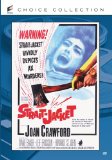| Reviews & Columns |
|
Reviews DVD TV on DVD Blu-ray 4K UHD International DVDs In Theaters Reviews by Studio Video Games Features Collector Series DVDs Easter Egg Database Interviews DVD Talk Radio Feature Articles Columns Anime Talk DVD Savant Horror DVDs The M.O.D. Squad Art House HD Talk Silent DVD
|
DVD Talk Forum |
|
|
| Resources |
|
DVD Price Search Customer Service #'s RCE Info Links |
|
Columns
|
|
|
Strait-Jacket (Sony Choice Collection)
Remarkably see-sawing Castle outing--at times hallucinatingly good then laughably inept--with Crawford operating on a whole different plane. Sony Picture's Choice Collection line of hard-to-find library and cult titles has re-released Strait-Jacket, the 1964 shocker from producer/director William Castle, written (at least initially, before Crawford got ahold of it) by Psycho's Robert Bloch, and starring Joan Crawford, Diane Baker, Leif Erickson, Howard St. John, John Anthony Hayes, Rochelle Hudson, George Kennedy, Edith Atwater, and Vice President of PepsiCo, Mitchell Cox (who does just fine, despite the carps). Now watched primarily by people who go in expecting to laugh at its admitted excesses and missteps, Strait-Jacket does have those often startling moments of nightmarish, cartoonish weirdness, too, that underrated (and unashamed) Castle delivered with unerring frequency. Lots of fun bonus features from Sony's 2002 release of Strait-Jacket have been ported over here, for this sharp, anamorphically-enhanced widescreen black and white transfer.
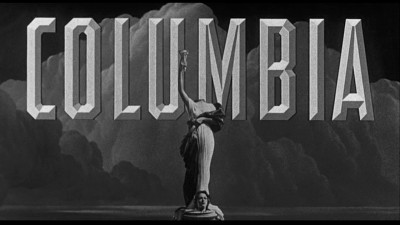
1943. A sultry Ohio farmland night. Young married stud Frank Harbin (Lee Majors), after some spirited juke-joint seduction, brings buxom little tramp Stella Fulton (Patricia Crest) back to his wife's farmhouse for a little barnyard fun...right in front of his "sleeping" three-year-old daughter, Carol (Vicki Cos). Unluckily for them both, Frank's 29-year-old red-hot-mamma-of-a-wife, Lucy Harbin (58-year-old Joan Crawford), comes home early from her out-of-town trip, and sees the couple in post-coital slumber. Grabbing an axe, Lucy de-nogginizes them both in front of wide-eyed Carol, and is promptly hauled off to an insane asylum for 20 years. Fast-forward to the West Coast, 1963. 23-year-old Carol (Diane Baker), having been taken in by Lucy's brother, farmer Bill Cutler (Leif Erickson) and his wife, Emily (Rochelle Hudson), is now a beautiful, confident young woman, an accomplished sculptress, and the steady date of handsome Michael Fields (John Anthony Hayes), the young scion of very wealthy dairy owner Raymond Fields (Howard St. John) and his prim and proper wife, Alison (Edith Atwater). When news of Lucy's release from the asylum reaches Carol, she's unsure how to act with the mother she barely remembers, when Uncle Bill brings her home. However, she soon takes a shine to the now-haggard, timid, emotionally-spent Lucy, giving her a make-over that looks remarkably like the one she had twenty years ago. Lucy, however, may not be ready for life outside the nut house, as she begins to hear voices...and as bodies begin to pile up, sans melons.
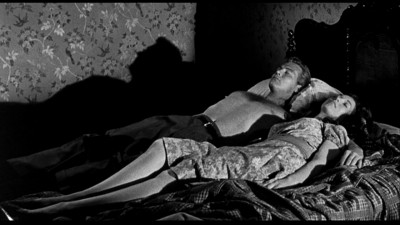
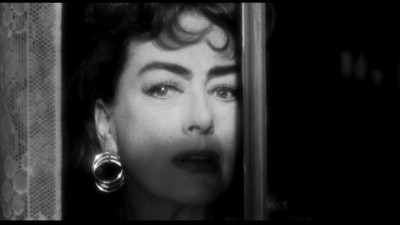
The dreaded "camp" label. I'm not sure you can read a review of Strait-Jacket (including this one, now...), or indeed reviews of many of William Castle's works, without seeing that word. It's a vague term that I try not to use because it has different meanings for different moviegoers, but mostly I dislike it because the way it's employed now by too many critics. The way they wield it, "camp" almost always smacks of condescension: "I'm smarter than this, I'm more mature than this crude silliness. Can you believe someone made this movie this way? So...I'm going to laugh at it to show how superior I am to it. " To be fair, I certainly don't mind laughing at movies I think go wrong; it's just my proclivities for mocking seem to naturally find outlet with more mainstream, "respected" movies which to my nose have that unmistakable and powerful odor of mendacity (thank you, Big Daddy). Something like Strait-Jacket, however--delirious and crude, but unpretentious--has an underlying validity to it that I like to take at face value (to me, a fatuous, pretentious, phony movie like To Kill a Mockingbird is far more unintentionally amusing than something like Strait-Jacket, particularly because so many people feel so impossibly reverent towards the former). The "camp" label is often used as a passive-aggressive sop to a "film snob's" own insecurities. They can't really admit they fully and completely enjoy watching something like Strait-Jacket, because everyone else says its so bad. And because they either won't or can't analyze it "straight, " they join in the derision...while reserving the right, secretly, to be entertained by it. What a waste of energy.
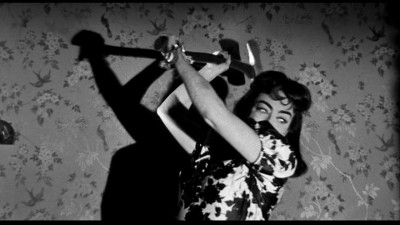
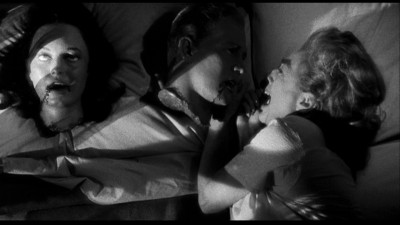
Admittedly, I'm dangerously schizophrenic when it comes to the auteur theory (one day it's beautifully elegant and so...right-sounding, and the next, I'm completely convinced it's utter bullsh*t), so I can't tell you as a fact that William Castle "knew" on some other level that he was capable time and time again of creating scenes and sequences that look like they come only from his movies. All I know is that I perceive this...screaming, lurid comic book sensibility to most of his suspense and horror movies, that resonates with me. Strait-Jacket is a good example...unless, of course, a Robert Bloch expert wants to make the argument these vibes are coming from him (see? You can't win). Here, in Strait-Jacket, on Castle's cheap, sparsely-appointed 1/4 inch plywood sets, with his dull gray color palette and his alternately boring, flat lighting and extreme chiaroscuro effects, he manages to shove in your face this decidedly creepy, nightmarish world that's visually restricted yet emotionally broadly painted, an interior world of psychosis and violence that plays like panels from a comic book or one of those sick '50s true-crime magazines.
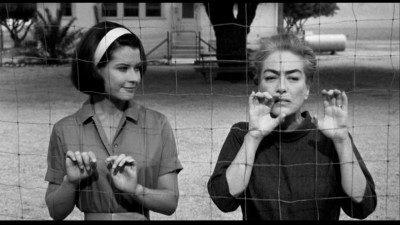
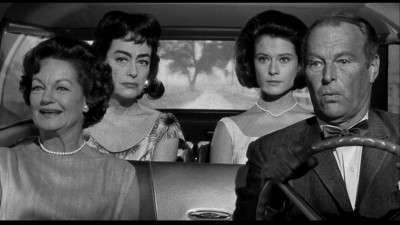
The opening reel is a masterpiece of brazen, shameless pulp sensibility, married to equally crude imagery. After the shock audio intro of Crawford's frenzied screaming (you could spell it out, like in the comics: "Aaaarrrrggggghhhhh!") and Castle himself channeling a circus freak show baker rasping, "Extra! Extra! Read all about it! Love slayer insane!" Baker then begins the ball rolling by telling her fiance all about her mother, with her description of Crawford sounding like something out of a combination police blotter and Mickey Spillane ("Lucy Harbin. Born and raised on a farm. Parents: poor. Education: meager. Very much a woman, and very much aware of the fact, "). After Castle gives us the garish details of Majors' seduction (he's really slobbering all over that poor girl), Castle comes up with one of his unique frames: Crawford peeking into her bedroom window and seeing Majors and his chippie in bed, looking for all the world like they're already dead--just like those crudely mocked-up, air-brushed real-life crime scene photos found inside True Detective and the like. It's such a bizarre-looking shot your first thought is ineptitude, but it's so consciously, deliberately posed in such an intentionally odd way, you realize Castle is tapping into something obsessing him--some morbid stillness following sex, perhaps?--that is then violently, shockingly contrasted by the frenzy Crawford brings to her chopping (why does Castle keep letting her whack away beyond all measures of good taste, almost inviting you to laugh? Because he's making a coarse, ugly shocker, not The Donna Reed Show). It's an intensity of contrast between stillness and vivid, sensational violence that comes over like a Tom and Jerry cartoon played for frightening keeps: you can laugh at it if you concentrate on the patently phony dummy heads or Crawford's outlandish costume...or you can feel unsettled at Castle's strange, deeply neurotic bursts of concentrated violence.
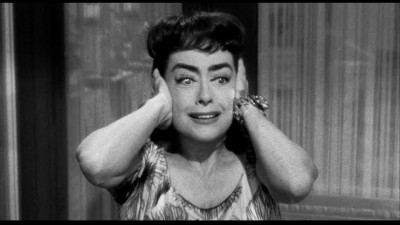
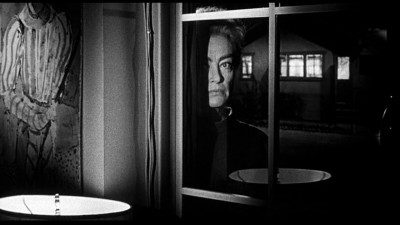
And yet there's nothing "camp" about the intensity of Crawford's performance, in either her "action" scenes or her relatively subdued dramatic ones. Crawford's performance in Strait-Jacket is feral; no two ways around it. She's acting like her life depended on this would-be cardboard thriller, and that dead-serious approach only deepens and transcends the already-disturbing material. We want to laugh when she's rattling those bracelets and expertly wielding that axe...but watch her eyes: in those split-seconds, she's living that moment, right then and there. It's frightening to watch. No less emotionally intense are her quiet scenes with Baker. When Crawford first sees Baker after 20 years, the subtlety and layering of her emoting is remarkable (when I read a critic dismissing this kind of acting as outdated and melodramatic, I'm reading a critic who thinks the only valid kind of performance is one that falls in line with today's faux-naturalistic, self-reflexive, ironic posturing and posing). Once you remember that Crawford started out in silents, you understand how adept she was in wordless moments like this.
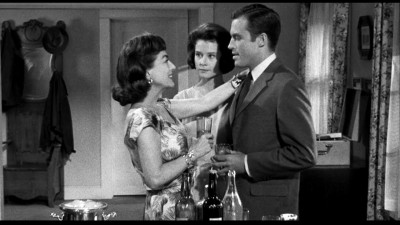
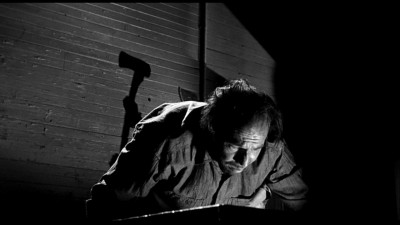
It's only when Castle fails to properly bridge or transition her shifts in tone does Crawford's approach produce bizarre, grotesque contrasts. Certainly Strait-Jacket's most notorious instance of this is the scene where Crawford meets Baker's fiance for the first time. I've never understood how so many critics can't seem to understand that Crawford is supposed to look ludicrous in this scene; they seem to want to blame the actress herself, who had approval over her costumes among other things, for this look (her character is dressed this way at Baker's insistence; she's supposed to look ridiculous trying to recapture her youth). However, I'm with everyone else when I write that despite seeing Strait-Jacket many times over the years...I'm just as much in the dark as they are as to why Crawford's character switches gears instantaneously and sexually attacks Baker's boyfriend. Later, her visit with her doctor tries to explain her behavior: she's trying too hard to relive her past, and making up for lost time. But still, it's far too abrupt a transition to be believed, with not enough background on the character's motivation to explain this crazy behavior (in one second, Crawford goes from being pathetically grateful in having her long-lost child's approval, to practically screwing her boyfriend in front of her). Of course, the scene itself, though, is a marvel of bizarro melodramatics, with Crawford jaw-droppingly wrong playing an aged tramp who thinks she's a young hot pistol, letting loose with hysterically funny come-ons (when he asks for Scotch on the rocks, she leers, "Oh...one of those,") while rattling her bracelets and rocking her hips to the music (when she tough-cookie lights a match off a phonograph record, with an accompanying, "ZZZrrrrriipppffff!" the effect is humorously galvanic). It's a wonderfully, inexplicably hilarious scene, thanks to fearless Crawford. Then again...she is supposed to look preposterous according to Baker's plan, so....
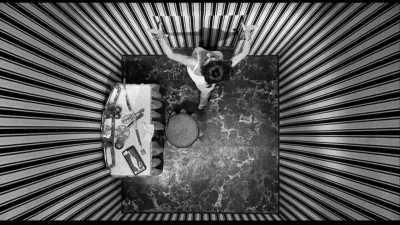
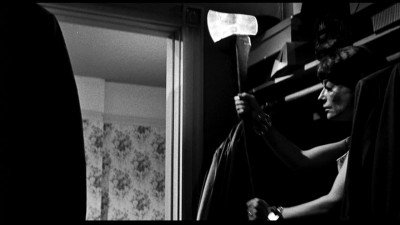
Castle's commitment to producing an exaggerated scare comic is no less complete than Crawford's in Strait-Jacket. Time and again I'm struck by Castle's unerring, even peculiar accuracy and timing in generating off-putting shock sequences--even if sometimes those individual scene aren't stitched together with the same matching care. The presence of obviously phony dummy heads in the bedroom scene with Crawford is often laughed at (...if you forget they're not supposed to be real, anyway), but Castle's timing is perfect when he pans over to get Crawford's unhinged screaming (again: total commitment from a seemingly equally unhinged Crawford). The heads may be fake, but Crawford's scream isn't. It's too bad Castle blows George Kennedy's beheading; he should have just had a frame or two establishing that dummy head before Crawford whacked it off (we get a full second or two of it, ruining the intended effect), but the prior sequence of Crawford watching Kennedy (enjoyably seedy and sleazy) slaughter a chicken is beautifully mounted, with the overpowering sound of the overhead windmill driving into Crawford's brain before Castle cuts to her comic strip scream as the blade comes down. A shot worthy of Castle's rival, Hitchcock--the bizarre powder room scene shot from way, way above as Crawford freaks out in a cell-like, stripped room--is powerful on its own...but it comes out of nowhere (we needed to see some of that initial dinner party where Crawford meets Baker's fiance's folks). And of course, no Bloch-written Castle exercise would be complete without a Psycho homage, when Howard St. John gets whacked in his clothes' closet (crudely done, but effective). SPOILER ALERT! The finale is pure Castle, with the patently phony mask work on axe-wielding Baker fitting right in with Castle's cartoony vision, before the melodrama kicks into overdrive as Baker screams, "I love you! I hate you! " over and over again, as Crawford (in an added scene she demanded, to focus the finale on her and not Baker) hugs a column weeping and exclaiming for her poor, psychotic daughter. Strait-Jacket's over-the-top ending--axe murders, cheap, unconvincing rubber masks, histrionic emoting--is unabashed pulp, but Castle's total, tasteless, crude commitment to it is one only a true artist would employ with such single-minded zeal.
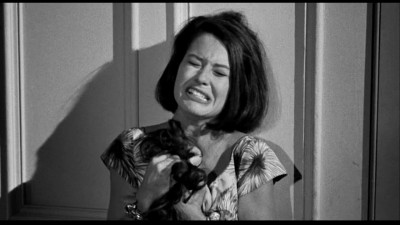
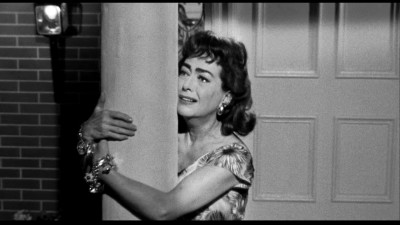
The Video:
The anamorphically-enhanced, 1.85:1 widescreen black and white transfer for Strait-Jacket looks quite good most of the time, except when video noise and grain overwhelm a few of the busier scenes. Otherwise, fine image detail is surprising strong, while contrast levels are solid.
The Audio:
The Dolby Digital English mono audio track has a very strong re-recording level. Hiss is not noticeable. English subtitles or closed-captions are not included.
The Extras:
All the extras from Sony's 2002 release of Strait-Jacket are included here. Battle Axe: The Making of Strait-Jacket runs 14:36, with some good background production info from well-spoken Diane Baker (still looks fantastic). An original short subject featurette, How to Plan a Movie Murder, runs 4:34. It features Castle, Crawford and Bloch talking about making the movie (clearly, this is an attempt to mimic Hitchcock's famous promo trailers for Psycho and The Birds). TV spots are included, along with a few silent Axe Tests footage, showing Crawford whacking that George Kennedy dummy (00:39). Finally, the most disturbing extra, Wardrobe Tests, running 3:26, is original silent footage of Crawford's lighting, makeup and wardrobe tests, set to creepy music. It's as scary and off-putting as anything in the movie itself.
Final Thoughts:
Lurid comic book scares, hypnotically arranged...for the most part. You can laugh at William Castle's Strait-Jacket if you want (he probably didn't mind, as long as you paid for your ticket), but that laughter doesn't negated Castle's uncanny ability to crudely patch together these eerie, creepy nightmare shockers. Not perfect Castle by any means (that would be The House on Haunted Hill, probably), but pulpy and juicy, with Joan Crawford giving an electrifying, otherworldly performance. I'm highly, highly recommending Strait-Jacket.
Paul Mavis is an internationally published movie and television historian, a member of the Online Film Critics Society, and the author of The Espionage Filmography.


|
| Popular Reviews |
| Sponsored Links |
|
|
| Sponsored Links |
|
|
| Release List | Reviews | Shop | Newsletter | Forum | DVD Giveaways | Blu-Ray | Advertise |
|
Copyright 2024 DVDTalk.com All Rights Reserved. Legal Info, Privacy Policy, Terms of Use,
Manage Preferences,
Your Privacy Choices | |||||||









